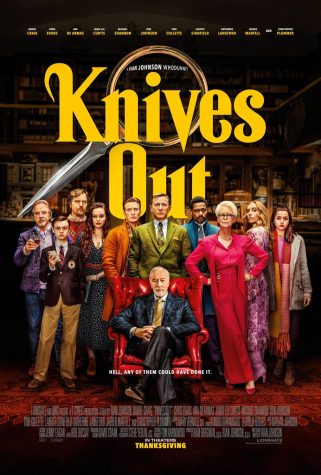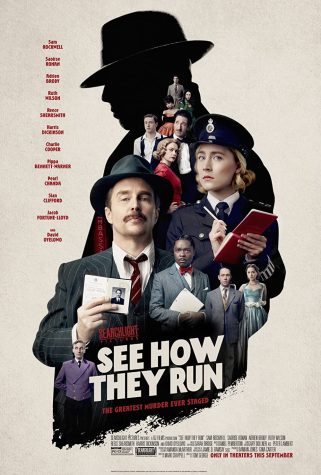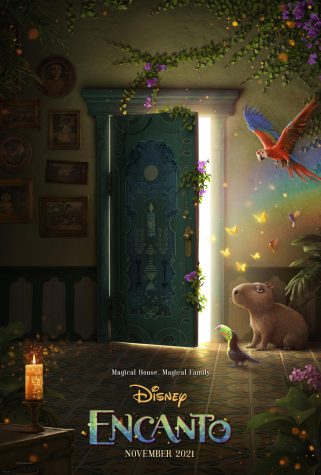Lovejoy’s “Pebble Brain” Will Stay Stuck in Your Brain
Sometimes, you just have those days where your life needs some romanticization. You need to be the main character of a coming of age movie. But no good movie is without its soundtrack. If you’re looking for the right music to back up your fantasies, the U.K. based indie band, Lovejoy’s second EP, “Pebble Brain,” is perfect.
Released on Oct. 13, “Pebble Brain” is a dynamic — albeit overwhelmingly British at times— record that gets so stuck in your head that you can’t stand to listen to anything else.
Lovejoy’s debut EP, “Are You Alright?” was released in May, and the band amassed over 1.6 million monthly listeners on spotify. The lead singer, Wilbur Soot, is best known for his Youtube and Twitch channels as well as his solo music career. He’s released both an EP, “Your City Gave Me Asthma,” as well as a trio of comedy songs including “Your New Boyfriend,” the music video of which has 58 million views on Youtube.
The first track on “Pebble Brain,” titled “Oh Yeah, You Gonna Cry?” sets the general tone for the EP. Despite some songs’ deeper meanings and heavier lyrics, most of them are quite upbeat, and in the case of “Oh Yeah, You Gonna Cry?” make you start tapping your foot if not getting up and dancing around your room.
The instrumentals throughout the record are remarkable, but in particular on track two, “Model Buses.” This song— the title of which is in reference to British Prime Minister, Boris Johnson— features a memorable guitar part that’s central not only to this song, but also to many others on the album. Especially in comparison to those on “Are You Alright,” the guitar parts throughout the EP show a large amount of improvement on the band’s part.
One aspect that really shines in this EP is the choruses of these songs. This in particular applies to the song “Concrete.” Accompanied by lively instrumentals— in particular from drummer Mark Boardman— the chorus of “Concrete” is akin to the power of what is (in my opinion), Lovejoy’s best song, “Sex Sells.” With the majority of songs on this album, but with “Concrete” in particular, the chorus is something you just have to sing— or, more accurately, scream— along with. While this is partly due to the difficulty understanding the lyrics in the verses as anything other than assorted angry British noises on the first few listens, it’s mostly because of the band’s strength in writing not only catchy but captivating choruses.
It seems near impossible for “Pebble Brain” to outdo itself at this point, but nevertheless, the next song, “Perfume” does just that. This song hits all of the marks. As one of the most memorable songs on the album, “Perfume” evokes a gut-wrenching, staring-at-the-ceiling, longing for the past kind of feeling. The music and melody is catchy, but beyond that, it’s something that sticks with you beyond getting stuck in your head. There’s not a normal way to describe the emotions that “Perfume” gives you. Vocally, “Perfume” is one of Soot’s best performances. While not showing off as much of his range as others on the album, the raw emotion on this track is riveting. The lyrics create an interesting storyline, with it both beginning and ending with the line “it’s 3:45 (a.m.),” turning the entire storyline of the song into a moment of overthinking that all occurs over the course of a minute. All of these aspects combined make “Perfume” one of the best songs on the EP.
“You’ll Understand When You’re Older,” the next track on the record, is yet another example of the instruments excelling, and even outshining the vocals. This song doesn’t have a chorus, but rather an impressive guitar solo that serves the same purpose. The addition of trumpets, which aren’t seen elsewhere on the album, adds interest and some new spice to the track.
The sixth song, “The Fall” brings something very different, but not unwelcome to the album. A bit lower and grittier, “The Fall” begins with a slightly unique sound from the previous tracks and a lyrical criticism of the British upper class. But this sound changes at the bridge. Starting with an intense instrumental buildup, the song takes a bit of an unconventional turn. Out of nowhere, Soot begins this powerful and dramatic monologue with “So, come on one and all to see the apathy…” The pure emotion and passion Soot delivers in this monologue is physically striking. It’s eccentric yet moving and empowering. This makes it not just one of the most memorable songs on the album, but in terms of music in general. It’s one of those songs that sticks with you.
The last song on the album is somewhat of a sentimental one. “It’s All Futile! It’s All Pointless!” is not an original song of Lovejoy’s. Soot initially released a more acoustic version of this song along with three others on an EP titled “Maybe I Was Boring,” containing songs that didn’t make it onto “Your City Gave Me Asthma.” Beyond that, however, “It’s All Futile” was the second song Soot ever wrote. The Lovejoy edition of the song is very different in sound to the original, but it’s a welcome change. Much more upbeat and now with more instruments than just guitar, the song feels much more full. It feels like almost an evolution of not only the song, but Soot’s music as a whole. It’s a perfect wrap-up to an extraordinary album.
“Pebble Brain” is a fantastic soundtrack for romanticizing your life. But beyond that it clings to you. Whether the songs are just stuck in your head or they left a lasting impression, when you listen to this EP, it’s hard to avoid getting a pebble brain.








